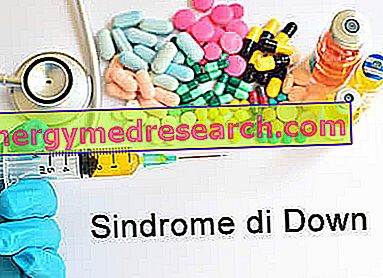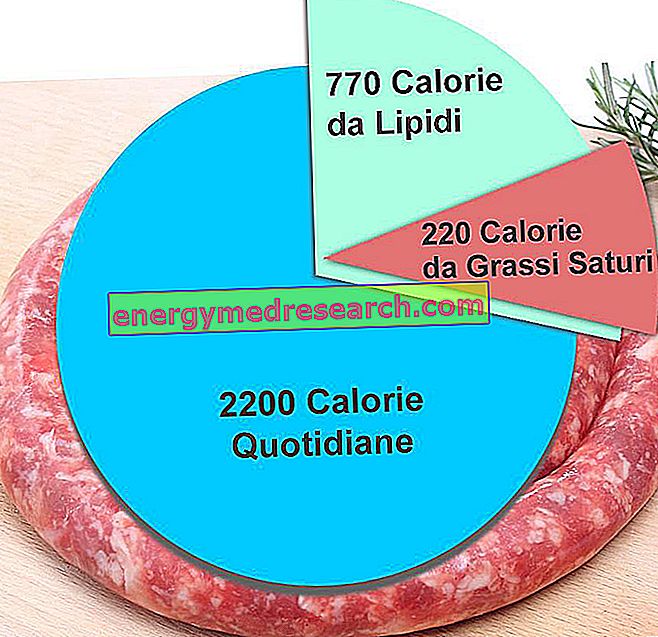Generality
Down syndrome is a genetic disorder also known as "trisomy 21". This name derives from the fact that individuals affected by this disease have an extra 21 chromosome, therefore, instead of the normal pair of chromosomes, they have three.
Three types of Down syndrome can be distinguished: trisomy 21 from non-disjunction, trisomy 21 from translocation and trisomy 21 from mosaicism.
Causes
The causes that lead to this genetic alteration, unfortunately, still remain unknown. However, there seems to be a certain correlation between the incidence of this genetic anomaly and the mother's age. More precisely, it seems that the probability that the genetic alteration occurs in the child increases with the age of the mother.
Symptoms
The presence of more genetic material than normal causes serious problems to the physical, motor and mental development of the newborn. Therefore, children with Down syndrome may present with mental, motor and speech delay, autistic behavior and attention disorders.
Individuals with Down syndrome also have particular anatomical features, such as: microcephaly, short stature, flat and broad facial profile, small and rounded ears, short and stubby hands.
In addition, patients may develop: muscular hypotonia, cardiac pathologies (the most common are inter-ventricular septal defects), intestinal malformations, visual changes (including congenital cataracts, glaucoma and strabismus), hearing loss, ear infections, diabetes, obesity and hypothyroidism.
Finally, it is not unusual for patients (both children and adults) with this disease to also suffer from depression.
Information on Down Syndrome - Drugs for the Treatment of Down Syndrome is not intended to replace the direct relationship between health professional and patient. Always consult your doctor and / or specialist before taking Down Syndrome - Drugs for the Treatment of Down Syndrome.
drugs
Unfortunately, there are no drugs for the treatment of Down syndrome and the therapeutic strategies that can be undertaken depend on the clinical manifestations that appear in each individual.
However, regardless of the symptoms manifested, the treatment of Down syndrome must include an educational program that promotes the development, growth and social adaptation of patients affected by the disease.
The pharmacological treatment of Down syndrome, on the other hand, is aimed at reducing its clinical manifestations and countering the disorders associated with it, such as, for example, glaucoma, type 1 diabetes mellitus, depression and hypothyroidism.

Levothyroxine
Levothyroxine (Eutirox ®, Tirosint ®, Tiracrin ®) is a drug that can be used to treat hypothyroidism that is often associated with Down syndrome. Hypothyroidism, in fact, is a fairly common condition in individuals with the syndrome, so much so that it occurs in almost a third of patients.
Levothyroxine is available for oral administration in the form of tablets, drops or oral solutions. The dose of drug to be taken can vary from 25 micrograms up to a maximum of 200 micrograms of active ingredient a day, depending on the severity of hypothyroidism. Therefore, the doctor will determine the most suitable dose for each individual on a strictly individual basis.
For more information on the drug therapy of hypothyroidism, it is advisable to consult the article dedicated "Drugs for the treatment of hypothyroidism".
Fluoxetine
Fluoxetine (Prozac ®) is only one of several antidepressant drugs that could be used to treat depression that often occurs in patients with Down syndrome.
Fluoxetine is an antidepressant belonging to the selective serotonin reuptake inhibitor (or SSRI) class and can be used to treat depression in both adults and children aged 8 years and older.
The dose of fluoxetine usually given in adult patients is 20 mg a day, to be taken orally.
In children, on the other hand, the dose of fluoxetine usually used orally is 10 mg a day.
In any case, the doctor will determine the most suitable dose for each patient, therefore, it is essential to follow his instructions.
For more detailed information on the different types of antidepressants used in therapy, see the article "Drugs for the Treatment of Depression".
Insulin
Insulin is the drug used in the treatment of type 1 diabetes mellitus, a metabolic pathology that can develop in patients with Down syndrome.
Insulin is given as a subcutaneous injection. There are different types of insulin (ultra-fast, fast, intermediate, slow, etc.) that can be used depending on the needs. For more information, please refer to the specific article "Type 1 Diabetes Care Medicines".
Beta blockers
Beta-blocking drugs can be used for the treatment of glaucoma that very often occurs in association with Down syndrome. In fact, this pathology is one of the most common sight disorders that occur in patients with trisomy 21.
Among the different types of beta-blockers that can be used in the treatment of glaucoma, we mention the timolol (Droptimol ®) that is used in the form of eye drops. Usually, it is advisable to start therapy by instilling a drop of eye drops in the eye, or in the eyes, affected by the disease. However, the exact amount of timolol to be used, the frequency of administration and the duration of treatment should be established by the doctor on an individual basis for each patient.
For more detailed information on the treatment of glaucoma, see the article dedicated to "Medications for the Treatment of Glaucoma".



